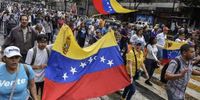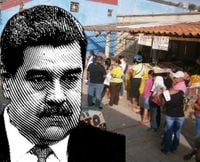In the heart of Venezuela, families like that of Alnilys Chirino are facing a daily battle to put food on the table, a struggle that has become emblematic of a nation in economic freefall. According to an August 27, 2025 report by ABC News, millions across the country are contending with a crisis that has left 80% of residents living in poverty and basic necessities—especially food—out of reach for most.
Chirino’s story is a familiar one. Her fridge and pantry, once stocked with enough to feed her three teenagers, now hold little more than rice, beans, and a few vegetables. Protein is a rare luxury, and meals are stretched to last as long as possible. “They ask me, ‘What are we going to do tomorrow? What are we going to eat?’” Chirino told ABC News, echoing the anxieties of countless Venezuelan parents.
The economic crisis, which began in earnest in 2013, has only deepened with time. Hyperinflation—reported by CoinCentral on August 27, 2025, to be exceeding 1,000% annually—has rendered the bolivar nearly worthless. The country’s minimum monthly wage remains stuck at 130 bolivars, or just $0.90, unchanged since 2022 and far below the United Nations’ extreme poverty line of $2.15 per day. Meanwhile, the price of a basic basket of food has soared past $500, according to the independent Venezuelan Observatory of Finances.
For many, this means skipping meals, relying on carbohydrates, and eliminating animal protein altogether. The consequences are stark: children go to bed hungry, skip school, or faint from lack of nutrition. “It’s their diet,” Chirino said, attributing her kids’ frequent headaches and fatigue to the meager food they can afford. The law promises students a daily free lunch, but that’s become a distant memory for most families and teachers interviewed by ABC News.
Soup kitchens, once a lifeline for thousands, have been forced to close as President Nicolás Maduro’s government cracks down on non-governmental organizations. The government, which did not respond to requests for comment on the crisis, has also imposed laws restricting NGO activity, further limiting aid to the most vulnerable. Even the World Food Program, which prioritized food-insecure regions like Falcon state, has cut assistance in 2025, slashing school feeding days from 20 to 8 due to funding shortfalls.
Amidst this hardship, Venezuelans have been forced to get creative. Many, like Chirino, buy food on credit at local corner stores, returning multiple times a day to purchase small amounts as money becomes available. “We give credit to the neighbors who do pay back when they receive their paycheck or stipend,” Diego Reverol, a shop owner, told ABC News. Government stipends are meager—about $4 monthly for some, and $70 from informal sales for others—but every bolivar counts in a country where the currency’s value can plummet overnight.
Yet, while many struggle to survive on what little cash they have, a parallel story is unfolding in Venezuela’s urban centers. As reported by CoinCentral and Pintu News on August 27 and 28, 2025, respectively, the country has witnessed a remarkable surge in the adoption of cryptocurrencies. With the bolivar’s collapse, citizens are turning to digital assets, particularly stablecoins like Tether (USDT), as a lifeline against hyperinflation.
Peer-to-peer trading platforms such as Binance and LocalBitcoins have become essential for exchanging cryptocurrencies. Businesses—from street vendors to tech startups—are increasingly accepting Bitcoin and stablecoins for payments, reshaping the local economy into a new kind of digital marketplace. “I use USDT for everything: buying food, paying rent. It is much more reliable than the bolivar,” said Carlos, a Caracas resident, to CoinCentral.
The appeal of stablecoins lies in their peg to the U.S. dollar, providing a shield against the wild swings of the local currency. Maria, a small business owner, explained to CoinCentral, “Stablecoins protect my business. I don’t lose money every time the bolivar’s value drops.” This sentiment is echoed by many merchants and individuals who now see digital currencies as a practical way to store value, conduct transactions, and even pay salaries.
Cryptocurrency’s influence extends beyond domestic transactions. According to Pintu News, by 2023, around 9% of the $5.4 billion in remittances to Venezuela were sent via crypto, as traditional services like Western Union became less attractive due to high fees and frequent foreign currency shortages. For many, stablecoins have become the preferred option for storing and transferring money, offering price stability that the bolivar can no longer provide.
Despite these innovations, challenges persist. U.S. sanctions have restricted access to major crypto platforms, and internet connectivity issues hamper widespread adoption, particularly outside major cities. The government’s stance on cryptocurrency remains conflicted: it introduced the oil-backed Petro in 2018, but the project has been largely dismissed by the public. Crackdowns on exchanges and mining operations have occurred sporadically, and the country’s main crypto exchange regulator was shuttered in 2023 amid corruption allegations, according to Pintu News.
Still, the digital revolution has proven resilient. Even as government policies fluctuate, and infrastructure lags in some regions, Venezuelans continue to embrace crypto as a survival tool. Economist Aarón Olmos told Pintu News that the urgent need to protect purchasing power from uncontrolled inflation is driving this trend, making cryptocurrency not just an alternative, but a necessity for many.
Back in Falcon state, the realities of hunger remain ever-present. At a local Catholic church, Chirino’s family and dozens of others gather for a weekly lunch at the soup kitchen—a rare moment of relief. “People eat, but they usually eat carbohydrates. And that’s how people survive,” said Rev. Gilberto García, whose church still manages to serve food despite the odds.
As the children finish their meals, some share what little they have with friends who arrived empty-handed. The sense of community endures, even as resources dwindle. For Chirino, the sight of her son reaching for half an arepa is a reminder that, in Venezuela, hunger is never far away—but neither is the spirit of resilience that keeps families going, one meal at a time.



